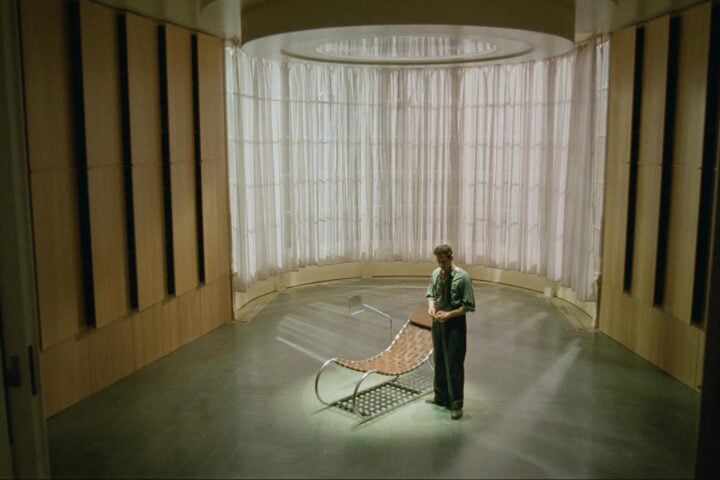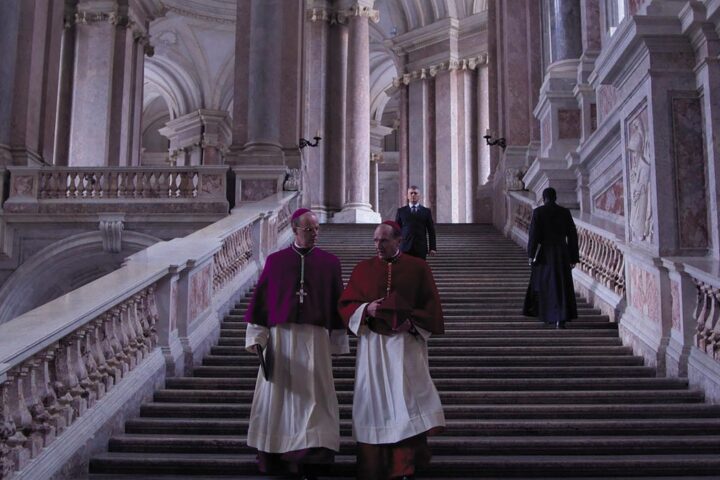Radu Jude’s Kontinental ’25 is unmistakably his own. That’s evident in the film’s self-derisive humor, caustic social critique, surreal interventions in everyday situations that are taken to their ridiculous limit, and an intrepid revisiting of history so specific to Romania that it ends up gaining a universal, almost fable-like force.
Jude’s cinema isn’t exactly absurdist, though it exposes the absurdities of a present reeling from the unresolved injustices of the past. In Kontinental ’25, set in the Cluj area of Transylvania, a Hungarian-Romanian bailiff, Orsolya (Eszter Tompa), is guilt-ridden after evicting an older man, penniless due to drinking and gambling, from his basement studio, after months of squatting, which led the man to commit suicide. Though Orsolya feels bad to have kicked the man out, she was just doing her job—and, besides, the man’s unsanitary living quarters needed to be demolished to make room for a luxury hotel (the Kontinental of the film’s title).
The situation that sets off the film’s plot into motion, where even the most precarious of living conditions of an elderly Romanian rendered destitute by modernity’s toxic seductions can’t be sustained, is fundamental: Out with the old, in with the new. Indeed, Kontinental ’25 is dotted with images of modern constructions that suggest an invasion of the Romanian landscape: from the inexplicable presence of mechanical dinosaurs in the woods and robotic creatures invading the personal space of passersby in the streets of Cluj to the gated urban development projects with signs that read “Private Property” lying next to centuries-old churches.
Jude weaves his mordant criticism of Romania’s fondness for corruption, hypocrisy, and social injustice into the fiber of the film in a subtler way than he did in 2018’s I Do Not Care If We Go Down in History as Barbarians and 2021’s Bad Luck Banging or Loony Porn. Yet, somehow, the result is also somewhat less satisfying. Kontinental ’25 is a slower, quieter film than Jude’s previous works, where the filmmaker’s penchant for subversive twists and punchlines appear in the shape of fleeting incisions to an otherwise more traditional narrative.
Orsolya’s encounters are almost always disrupted by a random element—suggesting comic relief to the unrelenting tragedy that Jude’s film, and his cinema more generally, uncovers: a sudden crass joke or racist comment, or a sexual hook-up that seems to come out of nowhere. Only the final conversation, which Orsolya has with a priest, lacks this disarming element of surprise where a supposedly harmless meeting is cracked by society’s nasty underbelly bobbing its head, making this final scene veer into tedium, given its lack of metaphorical payoff.
The through line of these conversational episodes and how they’re fractured by something incongruous (think of a Roy Andersson flight of fancy in the name of social critique rather than poesis) is rooted in an ancestral grudge that’s easily rekindled, or projected onto new proxies—namely the rivalry between Hungarians and Romanians. The city of Cluj itself, as we’re told by Orsolya’s mother (Annamária Biluska) at one point, was stolen from Hungary by Romania.
Kontinental ’25 is essentially a patchwork of conversations between Orsolya and others about the squatter’s suicide, throughout which she retells the story in virtually the same words: that he attached a cable against a thermostat to hang himself while Orsolya and the police waited for him to pack his belongings outside the building. The repetition of the anecdote ends up exposing the role of everyday people, even the ones with the kindest of hearts, as cruel agents of history. At each iteration, the anecdote gives rise to other topics, mostly world conflicts that threaten the fantasy of a cohesive, post-war Europe to collapse: Gaza, Ukraine, Yemen, and so on.
The profusion of EU and Romanian flags in the mise-en-scène highlights the ways in which just about every patch of real estate in Cluj bears the imprint, and the venom, of a necropolitical world order. In one of the film’s funniest gags, Orsolya runs into a former student, Fred (Adonis Tanța), who graduated but is now a food delivery driver. They end up getting drunk and having sex on perhaps the one bit of Romanian land still untainted by late capitalism’s steamroller.
But even there, as the unlikely lovers’ bodies copulate, we’re reminded of the exceptional, fleeting status of their bliss. Fred’s delivery thermobox lies next to the couple, the bright words on its side reading, “I am Romanian,” which are meant to elicit a more pleasant attitude from xenophobic Romanian drivers ready to run over delivery bikers that they presume to be from Sri Lanka. What’s ultimately most endearing about Kontinental ’25 are these moments when Jude’s signature as an auteur is made ferociously visible. A suspiciously quotidian situation suddenly cracks the film open, revealing its political engagement not with a professorial or patronizing tone, but with the disarming strategy of the ludicrous. And it’s to remind us of how ridiculous the state of the world is, and how ridiculous we are for accepting it.
Since 2001, we've brought you uncompromising, candid takes on the world of film, music, television, video games, theater, and more. Independently owned and operated publications like Slant have been hit hard in recent years, but we’re committed to keeping our content free and accessible—meaning no paywalls or fees.
If you like what we do, please consider subscribing to our Patreon or making a donation.





